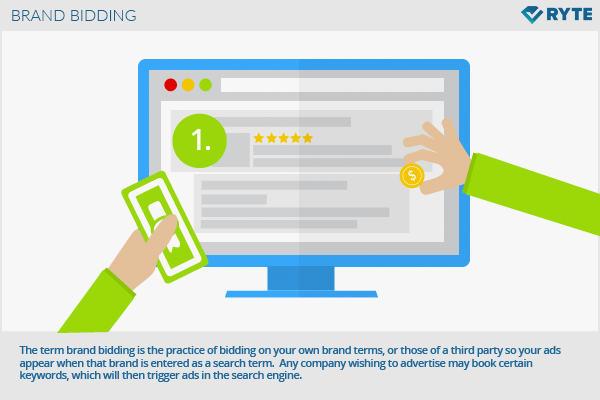Brand Bidding
What is Brand Bidding?
Brand bidding, also known as PPC brand bidding, is the practice of bidding on branded terms or branded keywords of a third party, in most cases a competitor. This way, your ads appear when that brand name is entered as a search term. The goal is to direct traffic away from the competitor's site.
General Information
Brand bidding is part of keyword advertising and is often used in a negative context, especially when it affects brand names of a third party. For example, company X might bid on the brand name of company Y and ads for company X would then appear in the search engine whenever someone looks for company Y’s brand name, the idea being to redirect visitors from company X to company Y.
PPC brand bidding can also lead to an increase in the price of bids for search engine marketing. The more companies or users bid on a certain keyword, the more expensive an ad for this keyword will be. For company Y, this means bookings on their own brand name are driven up in price by their competitors because greater competition arises for these keywords.
It is generally useful to bid on one’s own brand, especially when competitors also bid on your brand. While this drives up the price, it also results in more traffic to your website. For smaller companies, this is an opportunity to tap into more traffic for certain keywords and long tail combinations. Brand bidding can be used in all usual advertising platforms such as Google AdWords or Yahoo! and Bing Network. However, certain aspects have to be observed to avoid being liable to legal prosecution.
Examples of brand bidding
Bidding on your own brand
Company ABC wants to bid on its own brand name. Ads on Google Ads are booked and a brand name campaign is drawn up. The keywords include brand names such as “ABC.” If the term ABC is searched in a search engine, the company’s ad will be displayed in the search results.
Bidding on a third party’s brand
Company ABC would also like to show up with a Google Ads ad when users search for its competitor XYZ. So ABC creates a campaign that uses one of its competitor’s brand names as a keyword, for example “XYZ.” Now company ABC’s ad will be displayed next to XYZ’s actual brand ad. The use of third party brand names is generally considered trademark infringement and may result in legal consequences. Therefore, it is necessary to determine exactly what the criteria are for a legitimate brand name ad.
Brand Bidding and trademark infringement
Whether brand bidding is permitted by law depends on two factors. The European Court has not prohibited this practice, but it has set limitations, which companies need to adhere to when looking at brand bidding as an opportunity to increase traffic (and will accept the costs involved with it).
- The ad in the search engine has to make it clear that only the third party’s brand name is used and it is not the company the user searched for. This means that users must be able to easily distinguish the company which placed the ad from the original company the user searched with the specific keyword. This also applies to any confusion concerning the website or landing page linked to the ad. In other words, brand names in URLs.
- The brand name that was bid on may not occur in the actual ad copy. The brand name bid must therefore only be seen in the headline of the ad and must be clearly distinguished from the ad copy.
The law focuses on the consumer. They must be able to exclude an economic link between the advertising company and the companies listed under the keyword. Ultimately, however, there are individual cases which are legally disputable. Thus, bidding on brand names of particularly well-known companies may constitute a trademark infringement. Caution should also be exercised when posting ads in other countries.
Brand Bidding in Affiliate and Online Marketing
Brand bidding is a commonly used technique by publishers who are registered with an affiliate program. Publishers bid on their own brand terms because purchased traffic takes time, resources and money. Traffic as such does not necessarily have a specific ROI and ensures revenue. In the case of online shops, for example, it would more likely be transaction-relevant keywords that bring revenue. Merely bidding on a brand name involves financial risks.
Additionally, there are also legal aspects and possibly resulting costs. Brand bidding is only useful if it is used in a legally legitimate way, wherein the cost for traffic is clear and a sound strategy for monetization exists. Notwithstanding, AdWords experts recommend focusing on one’s own portfolio, one’s own brand, and of course transaction-relevant keywords.

